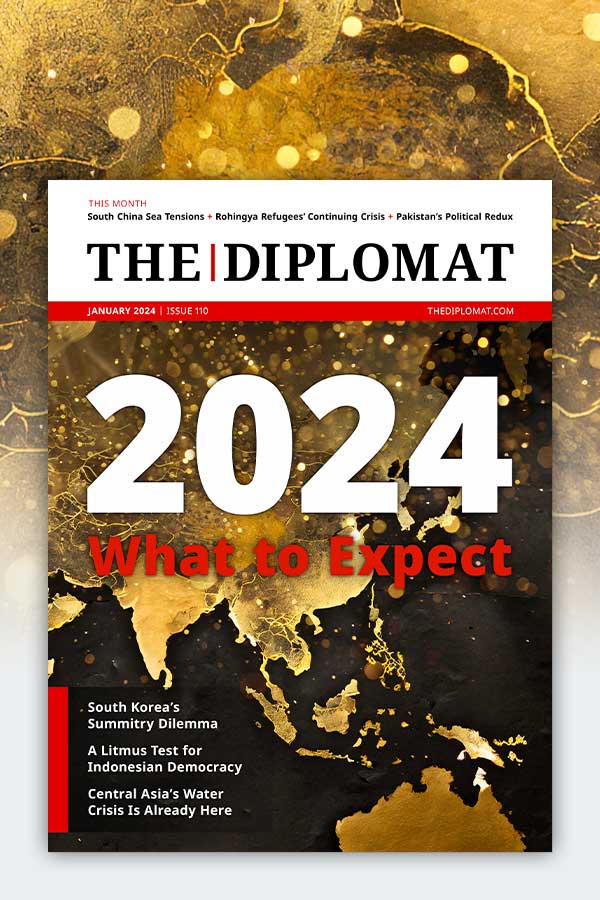| Welcome to the latest issue of Diplomat Brief. This week our top story explores the rapid rise in arrests and convictions of opposition politicians in Bangladesh. We also have an interview with Song Young-gil, former head of the Democratic Party of Korea, about the state of South Korean politics. |
| Story of the week | ![[object Object]](https://thediplomat.com/diplomat-brief/2024/vol01/images/feature.jpg?v=1) | Politics Is the Judiciary Being Weaponized in Bangladesh?What Happened: On October 28, Bangladeshi security agencies violently broke up a peaceful rally of the Bangladesh Nationalist Party, the main opposition party in the country. Since then, thousands of BNP activists and party workers have been arrested, and at least 1,594 have been convicted – most of them to terms that are long enough to bar them from participating in the next election. Our Focus: The legal crackdown on the BNP is part of the Awami League’s plan to secure victory in the January 7 general elections (which the BNP is boycotting, citing the widespread allegations of vote rigging in the last polls). The speed with which the judicial process is moving in these cases is “astounding,” writes Ali Riaz, a distinguished professor of Political Science at Illinois State University. Examining data from Bangladeshi courts, Riaz finds that “in the past two months, on average 177 BNP leaders and activists have been convicted each week” – working out to around 30 convictions a day. According to his tally, the convicted include 37 national-level BNP leaders, 606 local leaders, and 953 grassroots activists. Most of the cases stem from past election protests in 2013 and 2018, suggesting charges were dusted off (or outright fabricated) when politically necessary to sideline someone. What Comes Next: The surge in convictions suggests a worrying takeover of Bangladesh’s judicial system by the ruling party – a pattern that is a strong hallmark of authoritarian rule around the world. In an authoritarian system, the judiciary exists not to judge guilt or innocence, but to “‘pursue a very specific policy – the destruction’ of a political opponent,” writes Riaz, citing Judith Shklar. “In the past weeks, these words have come to life in Bangladesh.” Read this story |
| Behind the News | INTERVIEW Song Young-gilSong Young-gil, former head of the DP, mayor of Incheon, and a five-time elected lawmaker, on the prospects of an electoral alliance with former minister of justice Cho Kuk or former PPP head Lee Jun-seok: “If I end up creating a new party, the objective will be to oust President Yoon… A partnership doesn’t necessarily mean I’ll be working hand-in-hand with Cho or Lee. If their views align with mine, say, in building a coalition against the incumbent leader, we can compartmentalize and work towards a common goal.” Read the interview |
| This Week in Asia | Northeast Asia South Korea’s Opposition Leader Survives Murder AttemptLee Jae-myung, the head of South Korea’s Democratic Party, was stabbed in the neck on January 2. He survived the assault and the attacker is in custody, but the stabbing sent shockwaves through South Korea’s already polarized political arena. Lee, who was the DP’s presidential candidate in the last election, has been a thorn in the side of current President Yoon Suk-yeol and is looking to lead the DP to retain its majority in this year’s legislative elections. But he also faces corruption investigations and has been a controversial figure since the presidential campaign of 2022. Find out more | South Asia Bangladesh Goes to the PollsOn January 7, Bangladesh will hold its general election – an exercise many have denounced as a “farce” given the crackdown on opposition parties. The main opposition, the BNP, has refused to participate in the polls after widespread election rigging in 2018, instead demanding a neutral caretaker government. With a lopsided victory for the ruling Awami League essentially assured, the real question is what will come after January 7. Increased repression looks likely, but violent protests from frustrated Bangladeshis may ensue as well. Find out more | Southeast Asia ASEAN Raises Voice on South China Sea TensionsThis week, the Association of Southeast Asian Nations (ASEAN) belatedly registered its concern over the ongoing tensions in the South China Sea, at the tail end of a year that has seen numerous confrontations between Chinese and Philippine vessels. In a statement, the bloc’s foreign ministers expressed worries that the growing friction could threaten regional peace, and urged the rival claimants to engage in peaceful dialogue. While the statement did not go much beyond past efforts, and did not mention China directly, it was the first ever standalone statement that the bloc has issued on the South China Sea disputes, which involve five of its 10 member states, and was thus a welcome sign of ASEAN unity on the issue. Find out more | Central Asia Taliban Take Aim at Tajikistan and Pakistan
“Dozens of Tajikistan citizens have been killed in our operations and dozens of others have been arrested,” acting Taliban Defense Minister Mohammad Yaqoob Mujahid said in a December 31 press conference. Mujahid cited Tajikistan and Pakistan as the sources of just about all violent attacks in the country over the last year. Whether it’s true or not, the narrative fits into a familiar form: positioning violence as an external threat and not an internal one. Curiously, Pakistan and Tajikistan say much of the same about Taliban-run Afghanistan. Find out more |
| Visualizing APAC |  | Source: Central Bank Annual Reports Sri Lanka’s major economic indicators are slowly starting to recover after bottoming out in early 2022. See the full picture |
| Word of the Week | Diplomacy MatebianTetum for “The Mountain of the Dead,” the mountain in Timor-Leste earned the name after mass murders of civilians during the Indonesian army’s final swoop against the Timorese resistance movement in 1978. Find out more |
|  |

![[object Object]](https://thediplomat.com/diplomat-brief/2024/vol01/images/feature.jpg?v=1)

